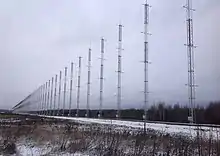 | |
| Country of origin | Russia |
|---|---|
| Introduced | 2 December 2013 |
| No. built | 1 operational in 2014, others planned |
| Type | Over-the-horizon radar |
| Frequency | 3-30 MHz (HF)[1] |
| PRF | 50 pulse/s[2] |
| Range | Around 3,000 kilometres (1,864 mi)[3] |
| Other Names | 29B6 |
Container (29B6) radar (Russian: 29Б6 «Контейнер») is the new generation of Russian over-the-horizon radar, providing long distance airspace monitoring and ballistic missile detection. The first radar, near Kovylkino, Mordovia, Russia, became operational in December 2013[1][3][4] and entered combat duty on 1 December, 2019.[5] Another Container radar is planned to be deployed in Kaliningrad.[6]
Description
The radar can monitor the airspace up to 100 km altitude and has a 3,000 km range. It was developed by NPK NIIDAR, which is also a developer of Voronezh-DM radar. The chief designer was Valentin Strelkin,[1] and the system's price was 10 billion rubles.[7]
The system consists of two separate antenna arrays: one for the transmitter and one for the receiver. The receiver antenna array contains 144 antenna masts, each 34 m high. The array has three sections: The inner section is 900 m wide with a 7 m spacing between masts, and the two outer sections are each 200 m wide with a 14 m spacing. The total array width is 1,300 m.[1] The receiver station has three arrays, arranged in an equilateral triangle. The transmitter antenna array has 36 re-configurable masts and is 440 m wide.[8]
Radar signals were detected by some amateur radio operators in the 9.2–19.745 MHz frequency band. Pulse repetition rate is 50 pulses per second, bandwidth about 14 kHz, frequency modulation on pulse (FMOP) is used.[2][9] The received signal has a sound similar to the Soviet early warning system Duga radar operated from 1976–1989, nicknamed "the Russian woodpecker".
Location
The receiving antennas are located 8 km south-west from Kovylkino, Mordovia, Russia 53°59′03″N 43°50′34″E / 53.9841°N 43.8427°E. The transmitters' antennas were initially located 300 km from the receiver, 5 km north of Gorodets town, Nizhegorodskaya oblast', Russia 56°41′36″N 43°29′10″E / 56.69328°N 43.48625°E. The site has been dismantled since at least February 2018, the new receivers are now located 15 km to the southeast 53°53′00″N 43°59′34″E / 53.8832°N 43.9928°E. The system is aligned on a bearing of 095 and 275 degrees to monitor airspace west of Russia, the Mediterranean Sea, and the Black Sea region.[10]
References
- 1 2 3 4 "29B6 Container" (in Russian). Retrieved 17 February 2015.
- 1 2 "29B6: Russian FMOP OTH Radar "Kontainer"". 9 February 2015. Retrieved 17 February 2015.
- 1 2 "В Войсках ВКО впервые заступила на опытно-боевое дежурство РЛС загоризонтного обнаружения "Контейнер"" (in Russian). 2 December 2013. Retrieved 17 February 2015.
- ↑ New OTH radar started operation in Volga region (TV footage) (in Russian). 3 December 2013. Retrieved 17 February 2015.
- ↑ "Первая в России загоризонтная РЛС заступила на боевое дежурство". tvzvezda.ru. 1 December 2019. Retrieved 1 December 2019.
- ↑ "Russia's advanced radar in Kaliningrad to monitor entire territory of Europe — source". TASS. 29 March 2020. Retrieved 20 March 2020.
- ↑ "29B6 Container" (in Russian). 14 February 2014. Retrieved 17 February 2015.
- ↑ "Russia activates new long-range radar". Facebook. 23 December 2013. Retrieved 17 February 2015.
- ↑ "29B6 OTH Radar Sounder". Archived from the original on 2015-02-20. Retrieved 17 February 2015.
- ↑ "Russian OTHR 29B6 Konteyner analysis". 25 February 2020. Retrieved 14 May 2021.
External links
- "29B6 Konteyner Over the Horizon Radar (OTHR)". globalsecurity.org.